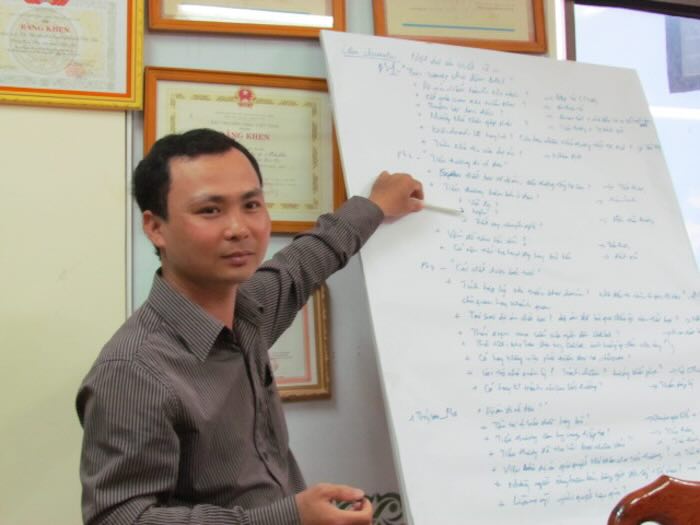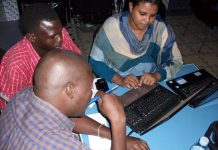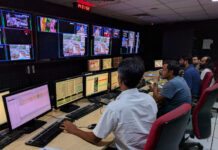 Media managers need to set clear objectives for all staff in order to get the best out of those who work for the news organisation.
Media managers need to set clear objectives for all staff in order to get the best out of those who work for the news organisation.
In an earlier article we looked at how media managers need to ‘Win the confidence and trust of the audience‘ with a clear set of values. . These need to be included in the objectives set for all staff.
There will be organisation-wide objectives, unit objectives (newsroom, technical, sales, marketing, etc.), and objectives set for the performance of individuals.
For example, an organisation-wide objective might be to be “the fastest, most reliable source of news reflecting diverse voices representing the whole community”.
That objective tells the audience that you will be first with the news, that you will deal only in facts, and that the news will reflect multiple perspectives.
You will need to work on what your corporate identity is and the slogan that best represents what you stand for.
But whatever you decide, the challenge then is to cascade that objective down through all departments, units and people in the organisation so that everyone is pulling together.
Once there is an inter-dependency linking the objectives, all staff, units, departments, and the organisation need to be appraised to see whether they are meeting them.
The appraisals are a continuous process with performance measured against agreed goals.
They culminate in a meeting between the member of staff and their line manager to check whether they, and, if appropriate, the units/departments they head, are meeting the agreed objectives.
These meetings can be held monthly, quarterly, half-yearly or annually, it’s up to you to decide what is necessary.
Management need to gather evidence of achievements or failures on a regular basis, noting what the member of staff did well and areas where they could have done better.
If staff are not meeting the agreed objectives, action needs to be taken. It could take the form of encouragement, the offer of training to help them develop in order to meet their goals, it might mean adjusting the objectives if they were set too high or too low, or moving people to different roles which are better suited to their skills and the organisation’s needs.
In terms of departments and units it might require a reorganisation of business units.
The appraisal process is essential for fine-tuning the running of a successful media business.
Setting objectives
This article deals with setting objectives for individual members of staff.
For most staff, the personal objectives are the most important, but they also need to know about the wider objectives. And because you want them to grow and take more responsibility you will need to set staff members clear and focused personal objectives in order to help them contribute fully.
Many organisations use what are called . SMART stands for:
- Specific (clear, detailed, well-defined)
- Measurable (quantity, comparison)
- Achievable (feasible, actionable)
- Realistic (considering resources)
- Time-bound (a defined timeline)
Specific
The objective is clear, detailed, focused and well-defined. It is results- and action-oriented.
It must emphasise the required outcome. You will need to communicate clearly what you would like to see happen.
Interestingly, some of the basic questions used every day by journalists will help your staff understand the first of the SMART objectives. These are: What? Why? Who? When? Where? and How?
- What am I expected to do?
- Why is this important?
- Who is going to do what?
- Who needs to be involved?
- When does this need to be done?
- How am I going to do this?
Achievable
There is no point setting an objective which the member of staff is unable to achieve.
Also, if the objective is set too far in the future you might find it difficult to motivate staff, and they might find it difficult to attain, mainly because it’s easier to focus on the present and the near future than it is on objectives set too far in advance.
Check the following questions:
- Can we get it done in the proposed timeframe?
- Do I understand the limitations and constraints involved?
- Can we do this with the resources we have?
- Has anyone else done this successfully?
- Is this possible?
Realistic
Realistic means ensuring the staff have the resources and support needed to get the job done.
However, while it’s important to keep objectives realistic, they must still stretch staff, otherwise they, and your news organisation are unlikely to grow and develop.
Ask these questions:
- Do the resources exist to make this happen?
- Will other priorities suffer?
- What needs to give, in order to make this happen?
- What needs to be achieved?
Measurable
It is sometimes said that if you can’t measure something, you can’t manage it.
Measurements help you know whether you are achieving your objective.
Ask these questions:
- How will I know that the change has occurred?
- Can these measurements be obtained?
- Who is doing the calculations?
- Are they aware of all the issues involved?
Time-bound
Objectives need deadlines. Without deadlines, things slip. Deadlines are also important for motivation and urgency.
Ask these questions:
- When will this objective be accomplished?
- Is there a stated deadline?
- Why is the deadline there?
- Is it realistic?
Bringing the best out of your staff
In the next article ‘Developing the potential of your staff‘, we will look at how to nurture, train and develop staff so that they have more opportunity of achieving their full potential.
Related articles








